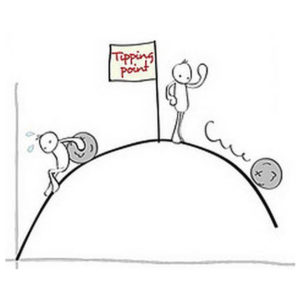 During more than 20 years of speaking to communities throughout the United States and Canada, I have been making the statement that we can and should end poverty. I have never encountered any resistance to the idea that we should end poverty. It’s the “we can end poverty” that causes people to bring up their objections with statements such as, “We have been fighting the War on Poverty over 50 years, and it’s only gotten worse.” But have we really been fighting all these years? I would say no; we haven’t had a national goal to eliminate poverty.
During more than 20 years of speaking to communities throughout the United States and Canada, I have been making the statement that we can and should end poverty. I have never encountered any resistance to the idea that we should end poverty. It’s the “we can end poverty” that causes people to bring up their objections with statements such as, “We have been fighting the War on Poverty over 50 years, and it’s only gotten worse.” But have we really been fighting all these years? I would say no; we haven’t had a national goal to eliminate poverty.
First, the war in Vietnam increasingly distracted the Johnson administration’s focus from the War on Poverty. Some safety nets were implemented, such as the Food Stamp Act of 1964, the Social Security Act of 1965 that created Medicare and Medicaid. However, these safety nets created an array of allopathic remedies. Some would argue these remedies make people too busy with paperwork, getting their basic needs met and lessening the urgency of finding a job. This is a poverty management system.
Furthermore, there are no financial incentives from federal agencies for long-term results of supporting people out of poverty and increasing economic stability. The baby boomers provided such a substantial labor pool that local economies did not need to worry about qualifying those in poverty for the workforce. Without pressure from business, poverty management continues in government and with community-based organizations addressing various needs of small target populations.
My strong belief is that human beings can eradicate the condition of poverty. The challenge is not if we have enough resources to do it – because we have enough. It is not if we know how to make the necessary systemic changes – because we know enough. First and foremost, the challenge is aligning the conviction that we can and should end it.
Because society could be easily overwhelmed by the massive task of ending poverty in the face of realities described above, I have found value in an article by scientists on tipping points. They discovered that when just 10% of a network’s population holds an unshakable belief, the majority of that network of people will adopt that belief. As Boleslaw Szymanski at Rensselaer  Polytechnic Institute has elaborated:
Polytechnic Institute has elaborated:
“When the number of committed opinion holders is below 10%, there is no visible progress in the spread of ideas. It would literally take the amount of time comparable to the age of the universe for this size group to reach the majority. Once that number grows above 10%, the idea spreads like flame.”
We have all seen in our time social movements that reached a tipping point and fundamentally changed society. How can we intentionally lead in a manner that causes a tipping point in our society? Achieving a tipping point is the goal that focuses Circles USA’s work to inspire and equip leaders to build Poverty Reduction Labs and Circles Chapters to support 10% of households in their communities to climb out of poverty. The theoretical potential of a tipping point is that once 10% is reached, momentum will take over, and the process of reducing poverty will become easier as more people embrace the effort.
Meeting resistance from within our own minds, as well as from those in our communities, we will need to align our intention to be transformational leaders. We need to follow our conviction about ending poverty, no matter what we confront along the way. Otherwise, we will be vulnerable to conforming to the status quo and colluding with a poverty management system that maintains poverty.
The guiding principle for the Transformational Leadership Program is to “become the change you want to see happen.” (“Be the change that you wish to see in the world” has been attributed to Mahatma Gandhi, although Wikiquote attributes the principle to Arleen Lorrance, at the Teleos Institute.) We are each hard-wired to want to make a difference in the world. If you assert the belief that we can support 10% of children out of poverty, you will eventually find others to join you. Together, you can build your own momentum toward a tipping point of people who will mobilize a new poverty reduction system around that goal in your community.
Warm regards,
Scott. C. Miller, Founder and CEO, Circles USA

The content for this Blog Series is drawn from the Poverty Reduction Lab program, a collaboration with CQIU. The program’s focus includes:
- Dismantling the poverty management system,
- Leading your community through the four stages of change, and
- Creating a pathway to end poverty.
To stay tuned, sign-up for The Big View Newsletter, our monthly bulletin about poverty research and policy change.
